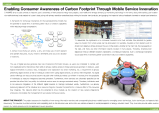Enabling Consumer Awareness of Carbon Footprint Through Mobile Service Innovation (C-AWARE)
About the Project
C-AWARE aims to build services to improve users' awareness of their personal energy consumption, and modify their energy demand, by monitoring technology in the home, along with tracking user location via mobile devices; local analysis of a user's data, along with privacy-sensitive centralised data mining for broader trend analysis; and gauging the impact of various feedback channels on actual user behaviour.
The project assesses the feasibility of new energy information services and corresponding business models based on emerging sensor technology, fusion techniques and opportunistic networking. The services must be functional and compelling both to the individual user and to the user collective based on social perceptions of energy reduction need. They must also provide viable revenue streams for mobile operators and end-application service providers.
Underlying Theories
A reconceptualisation of service through a service-dominant logic (S-D Logic) was proposed by (Vargo 2004) as an alternative perspective to the traditional goods-dominant view of value. S-D Logic proposes that there are no ‘services’ or ‘goods’, but that all offerings are bundles of potential value, and goods are merely value propositions which are realised in use (Vargo 2011). It also proposes that an offering’s value is co-created only in use and in context by the individual. So, the potential exists for the occurrence of contextual invariances, when multiple individuals have the same contexts for value co-creation, i.e. a cluster of contexts.
For example, travellers at train stations wish to check train departure times wherever they are in the station, whether at the main hall, the newsagents or the café, and there are often information boards located in many places. Therefore, checking train departure times at different locations represents a contextual invariance. Such a contextual invariance could assist firms in achieving better coordination (value co-creation) capabilities.
Vargo, S.L. and Lusch, R.F. (2004) Evolving to a New Dominant Logic for Marketing, Journal of marketing, 68(1), p.1-17
Vargo, S.L. and Lusch, R.F. (2011) It’s all B2B...and Beyond: Toward a Systems Perspective of the Market, Industrial Marketing Management, 40, p.181-187
Achievements
A framework for contextual invariances for the business/pricing model continues to be developed, as it has the potential to assist firms in achieving better value co-creation capabilities and in reducing energy consumption.
Core Research Team
Publications/Research Outputs
Energy monitor prototype installed at the Cambridge University Computer Laboratoryin the William Gates building (http://www.cl.cam.ac.uk/meters/)
Ng, I & Briscoe, G (2012) Value, Variety and Viability: New Business Models for Co-Creation in Outcome-based Contracts. International Journal of Service Science, Management, Engineering, and Technology, forthcoming. Interim location: WMG Service Systems Research Group Working Paper Series, paper number 06/12, ISSN 2049-4297. Available at: http://wrap.warwick.ac.uk/42446/
Ng I, Guo L, Ding Y (2012) Continuing Use of Information Technology as Value Co-creation: The Role of Contextual Variety and Means Drivenness. WMG Service Systems Research Group Working Paper Series, paper number 07/12, ISSN 2049-4297. Available at: http://wrap.warwick.ac.uk/42448/
Ng, Irene C.L. and Gerard Briscoe (2011) Value, variety and viability: designing for co-creation in a complex system of direct and indirect (goods) service value proposition. The 2011 Naples Forum on Service - Service Dominant Logic, Network & Systems Theory and Service Science: Integrating Three Perspectives For A New Service Agenda, 14-17 June, Capri, Italy
Funding
Ref: EP/I000186/1
Project Timeframe
Project Poster

